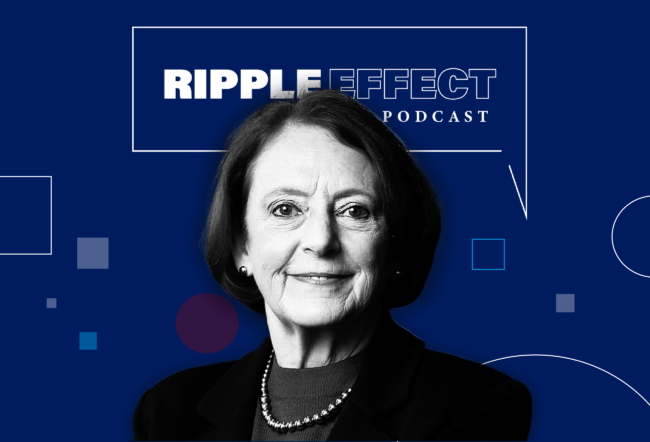In 1969, Howard Marks — armed with degrees from Wharton and the University of Chicago’s Booth School of Business – was still unsure what career he wanted to pursue. He interviewed for “literally seven different jobs in seven different fields,” including consulting, accounting, treasury management and investment banking, among others. There was one job, Marks said, that he wanted more than all the others. He did not get it.
“Thirty years later, I happened to correspond with the guy from that firm who was the recruiter back in 1969,” Marks recalled. The recruiter remembered him and offered to reveal why he was not hired. “He told me, ‘The partner in charge came in that morning hung over and made the wrong call.'” Then Marks delivered the punch line: “If it hadn’t been for that bit of bad luck, I could have spent 30 years at Lehman Brothers,” the defunct banking giant whose catastrophic 2008 collapse marked the beginning of the subprime mortgage crisis.
Marks clearly felt much luckier to have become co-founder and chairman of Oaktree Capital Management, L.P. He founded Oaktree in 1995, and according to Forbes’ profile of Marks in “The World’s Billionaires,” the firm — which went public in April 2012 — has $76 billion in assets under management, including money from 75 of the 100 largest U.S. pension plans.
Marks’ speech inaugurated Wharton’s Howard Marks Investor Series, slated to bring high-profile investors to the school to share real-world investment perspectives with graduate and undergraduate students.
Why the ‘Nifty 50s’ Weren’t So Nifty
According to Bloomberg, Oaktree holds the distinction of being the world’s largest distressed-debt investor, an area that the firm entered in 1988. Distressed debt, or distressed securities, is the debt on companies that are bankrupt or almost certain to become bankrupt. Marks described how he came to this type of investing as a reaction to the environment of his early career.
“Success in investing is not a function of what you buy. It’s a function of what you pay.”
When Marks joined Citibank in 1969, the company — along with other big New York banks like Chase and JP Morgan — practiced ‘Nifty 50’ investing, he said. They emphasized buying the stocks of the 50 highest-quality, fastest-growing companies in America, which at the time included Xerox, IBM, Kodak, Polaroid, Merck, Textron and Coca-Cola. “The official dictum was if you were buying the stock of a good enough company, it didn’t matter how high a price you paid.” But it did matter, Marks noted, and people were paying about five times what the stocks were worth. “By 1973, the people who held those stocks had lost 90% of their money.” The Nifty 50 stocks eventually became an often-cited example of unrealistic investor expectations.
“Then in September of 1978, Citibank asked me, ‘There’s some guy named Milken or something in California. He deals in high-yield bonds. Can you figure out what that means?’” Marks recalled. Meeting with controversial financier Michael Milken proved a pivotal moment for Marks. He started Citibank’s successful portfolio of high-yield bonds in 1978 and stayed until 1985.
What his career experience so far had told him was that with its Nifty 50 policy, Citibank had invested in “the best companies in America and lost a lot of money.” Then it invested in “the worst companies in America and made a lot of money,” Marks noted, adding that “it shouldn’t take you too long to figure out that success in investing is not a function of what you buy. It’s a function of what you pay.” An asset of high quality, Marks pointed out, can be overpriced and be a bad investment; an asset of low quality can be bought cheaply and be a good investment. Distressed debt is the lion’s share of what Oaktree handles today, and Marks said the company has been enormously successful – consistently so — in that area.
“Our return over the past 25 years has been 23% a year. And 95% of our outcomes are positive,” he noted, adding that Oaktree has raised about 50 funds over the same period and never had one that lost money. “It’s not a crapshoot like — if you’ll pardon the expression — venture capital, where you invest in 10 companies but if one of them turns out to be Google, you’re a success.”
‘Old-fashioned Scruples’
Referencing a book by famed investment advisor Charles Ellis called Winning the Loser’s Game: Timeless Strategies for Successful Investing, Marks said he doesn’t play “winner’s” tennis — he plays “not-loser’s” tennis. “If you think you can see the future and the world is going to go according to your decisions, go for winner’s tennis. But if you think the world is full of randomness and uncertainty, spend your time trying to avoid losers.” The Oaktree model is based on the latter, Marks noted: If we avoid the losers, the winners will take care of themselves. “If we can make a large portfolio of investments where none of them [strike out], then we’ll have … no bad ones to pull down the average.”
Another metaphor for successful investing which Marks is fond of citing is based on his many years in California. He compared an investment portfolio to a house located in an earthquake zone. “The house might have a structural flaw. And you might live in that house for 30 years and it doesn’t fall down. But that doesn’t prove it doesn’t have a flaw — it only means it wasn’t tested.” Marks said that the important question about a portfolio is not if it made money when the market went up, but if it would have stayed intact if the market went down: “Has the investment professional been prudent, farsighted and versatile enough to include risk controls at the same time as upside potential?”
“In September of 1978, Citibank asked me, ‘There’s some guy named Milken or something in California. He deals in high-yield bonds. Can you figure out what that means?’”
Marks also said he takes pride in his business practices and, to use his term, “old-fashioned scruples.” Among these he listed were fair treatment of clients, avoiding conflicts of interest, candid and transparent communications, acknowledging mistakes, and sharing the fruits of success with employees. “We did it on the high road,” Marks said of his success. “We did it in a way that if our spouses or children knew about how we conducted ourselves, we would be proud.”
As for today’s business climate, “I don’t say this to depress you, but I think we are in a low-growth period,” Marks noted, adding that from the 1950s until the financial crisis of the late 2000s or just before, America had a “great environment [for growth]. I imagine people saying, ‘When are we going to get back to normal?’ I don’t think that was normal; it was the best of times.” Marks suggested that after the trauma of the crisis, it will take time for the country to achieve a comparable level of confidence, which he pinpoints as the key determining factor. “Sometimes I think confidence is the only thing that determines economic outcomes. Confidence is largely self-fulfilling.”
He also stated that credit is not going to play as large an expansionary role as it did in past decades’ economic growth. “Credit is one of the reasons the world is in trouble now. Countries like Greece, France, Italy, Portugal and Spain have to practice austerity now because that’s what happens when you spend money you don’t have.”
Overall, Marks does foresee some limited economic recovery. “In 2013, it felt to me like two steps forward, one step back,” he noted. “I’m optimistic for 2014: I think it will be more like three steps forward, one step back.” But he warned that the current low return on credit instruments, due to low interest rates, has spawned some risky behavior in the market. “If the market is pro-risk, then risky securities can be issued. We have to make sure that it’s not we who buy them.”
An audience member asked Marks what he thought about new currencies like Bitcoin. Marks said that Bitcoin did not constitute dependable, safe, consistent investing. He likened it to investments such as gold, oil, paintings, jewelry or Internet start-ups with no revenue to show, saying that these things have no intrinsic value — only the value people give them. Stocks, on the other hand, have intrinsic value. “If a company produces a $2 dividend, and it’s highly likely to be able to do that for the next 20 years, you’re not going to sell that stock for $2 because you could double your money every year. You can base your decision on intrinsic value.”
“The Oaktree model is that if we avoid the losers, the winners will take care of themselves.”
In addition to his success in investing, Marks is the author of The Most Important Thing Illuminated: Uncommon Sense for the Thoughtful Investor. For many years, he has also written highly-regarded investment memos for clients (with entertaining titles such as “Getting Lucky,” “Ditto,” “It’s All a Big Mistake” and “How Quickly They Forget.”) He encouraged audience members to polish their writing skills, describing it as a good way to distinguish oneself from competitors in the workplace: “You can get a lot of favorable attention when the recommendations that you submit are well framed and well argued.”
Life and Luck
Marks said he loves to talk about luck, and feels he has been personally lucky in his life. He credited, among other things, a semi-random encounter with Penn’s Japanese Studies department as one of the experiences that changed him for the better. When he went to Wharton in the 1960s, Marks noted, one of the requirements was to take a course in the literature of a foreign country. He chose Japanese literature “for some bizarre reason,” and said it turned him “from an indifferent student into a serious student.”
Marks, who ended up taking a number of classes in Japanese studies, added that the lessons he learned “really contributed to my philosophy as an investor — [teaching me], among other things, that change is inevitable — you can’t hold back the process — and you have to adapt.
“Do things you like to do,” Marks told the audience. “It’s OK to take a drudge job and work in an investment bank 20 hours a day for a couple of years if it will advance you up that career path, but don’t do it for 30 years. This is the only life you get.”



